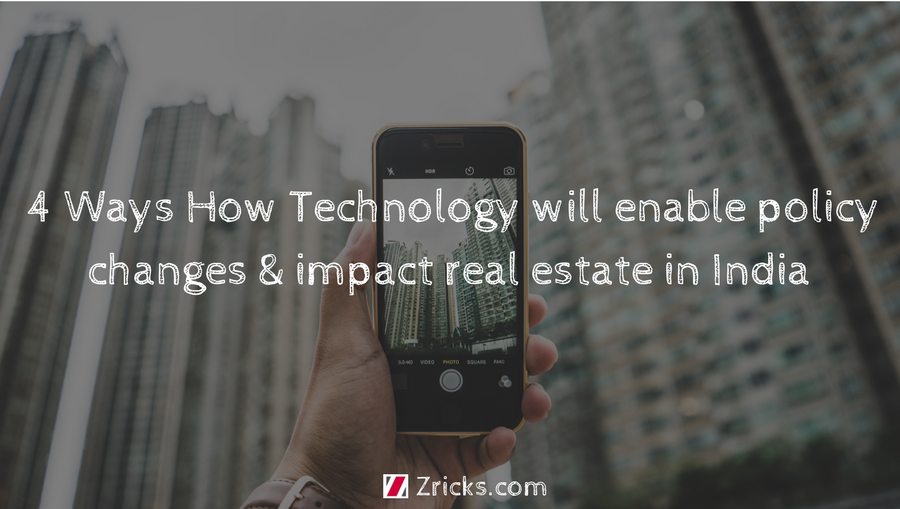4 Ways Technology will enable Policy Changes & Impact Real Estate in India
Share 4 Ways Technology will enable Policy Changes & Impact Real Estate in India
Across the globe, technology is rapidly changing the way we live and work. It is only a matter of time that it permeates into almost every aspect of our lives. Recently, the Bombay Municipal Corporation became the first civic body in the country to implement technology in governance by making the development plan reservations available on its mobile app using Geographic Information System to capture, manage and present geographic data.
The Government is actively promoting the use of existing and emerging technology in city management and governance. This stance was further reinforced by allocating a budget of INR 3,073 crore in the 2018-19 for the Department of Science and Technology, to contribute towards focused developments in emerging spheres of Big Data Analytics, Artificial Intelligence, Internet of Things and Blockchain.
The real estate sector is no exception to this technology innovation. India is one of the most dynamic markets in the property and technology or ‘Proptech’ space. India leads APAC in the number of Proptech deals by recording 77 deals amounting to $ 928 million in the past 4 years. Technology was also a crucial driver in the Smart Cities initiative with the states undertaking local reforms and utilizing information technology to improve administrative efficiency. Some notable technology-driven innovations are already being implemented in the real estate sector, and they are acting as agents of change for business practices, processes and customer experience.
Digitization
RERA is an excellent case of technology being actively used in the dissemination of residential data in the public domain. In the future, more data is expected to be digitized and made available. Government portals such as data.gov.in are organizing and delivering various data points in areas like infrastructure, water resources, land, housing, economy, labour and employment, finance, etc., in easy to consume formats. Large scale implementation will reduce the due diligence time by a mile, assisting faster and efficient analysis of critical legal ownership documents.
Automation and Artificial Intelligence (AI)
Given the potentially negative effects that automation and AI can bring to jobs in the future, it is very important that organizations create an environment to adopt and adapt to technology. It is important to move beyond simply tackling and softening the impacts of technology to actually accelerating technology adoption in order to lead the transformation. Various developers are already adopting chat-bots to assist potential customers. With improvements in AI, use of such automation tools is expected to gain momentum in the future.
Virtual Reality and Drones
Virtual reality, will help buyers explore projects from the comfort of their homes, a great tool to minimize time that is usually expended on physical site visits. Similarly, drones can facilitate a bird’s eye view of the surroundings, show property features as well as track the progress of construction of projects. Currently in India, the operation of drones has multiple restrictions and their effective use will depend largely on the regulations placed on them.
Blockchain
This online ledger tracking technology that recently gained prominence due to its use in bitcoin transactions could have far reaching uses, such as in the opaque world of land records. The technology is seeing increased traction, with India funding US$1.7 billiontowards Blockchain start-ups in 2016. States like Andhra Pradesh and Maharashtra are already looking at using blockchain in maintaining land records and will make a decision based on the results of the pilot projects. In the future, this technology could also be used to create smart contracts and track progress made on deals helping investors, occupiers and landlords in guaranteeing authenticity of contracts, records, and data.as it is virtually impregnable to tampering
Other upcoming technologies such as Building information modelling, predictive analysis and integrated workspace management will help improve productivity, buyer experience and enable sustainability and energy efficiency. Technologies such as 3D printing, when implemented on a large scale in Real estate will help minimize costs, labour and time. The Internet of Things is a breakthrough technology which can be used to control lighting, monitor temperature and aid in energy management for homes or offices. It can also be helpful in effective waste management, Smart parking, traffic lighting, video surveillance, safety etc
Looking Beyond
Looking into the future, the use of technology will be all-pervading, bringing about a significant positive changes in its wake. This would not only have far reaching impact on the nature of jobs in the market, future workplaces, smart cities and construction technologies, but also client experiences, interactions and modes of transactions amongst many other things. It is time that we look at their positive implications, embrace emerging technologies and utilise the immense benefits to enhance and upgrade the way we work and live.
Request a Call Back

